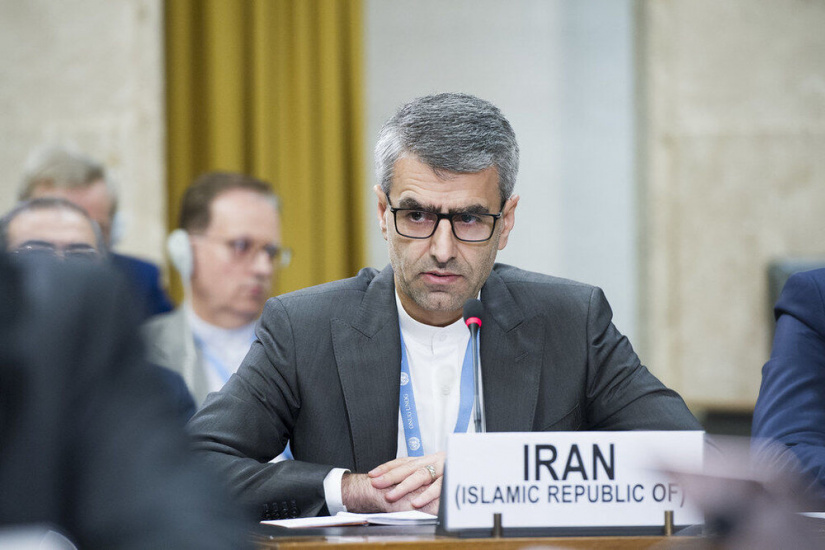Iran censures Germany over allegations of human rights violation

“It has long been proven that the external interferences are inherently antithetical to, and damaging for, the promotion of each and every one of these rights,” Esmaeil Baghaei Hamaneh said on Tuesday.
He made the remarks at the 45th session of the UN Human Rights Council on Tuesday.
“I deliver this statement in response to the statement launched against Iran on Friday morning by Germany--allegedly on behalf of a number of countries that are tellingly anonymous by far--as repeated further by a few European delegations,” Baghaei Hamaneh said.
The allegations are “mainly based on faulty generalization of twisted or incomplete information about certain individual cases,” the ambassador noted, adding, “Human rights, civil, political, economic, social and cultural, are all interdependent, indivisible and interrelated.”
The remarks came days after Germany issued a statement to the UN Human Rights Council on behalf of 47 countries expressing concerns about alleged violations of rights to freedom of expression, association and assembly in Iran.
Last week, the United Kingdom, France and Germany summoned Iranian ambassadors to their countries in a coordinated diplomatic protest of Iran’s alleged mistreatment of dual nationality and political prisoners.
On Monday, the last day of the week in which Iran annually marks the sacrifices made during the eight-year war imposed by former Iraqi dictator Saddam Hussein on Iran, Foreign Minister Mohammad Javad Zarif tore into the three European powers.
“You assisted Saddam with $75bn … and now you make claims?” he said, adding that the Iraqi dictator’s backers gave him aircraft and chemical weapons to topple the newly formed nation.
“Chemical weapons from Germany and the Netherlands were given to Saddam to use against the Iranian people,” the chief Iranian diplomat said, asking, “And now you claim to be civilized?
In his Tuesday statement, Baghaei Hamaneh voiced Iran’s determination for constant improvement of human rights in all its aspects despite all the odds including systemic stigmatization as well as unlawful vindictive sanctions and belligerent bullying and pressure by the United States against the Islamic Republic.
Pointing to Iran’s fight against the coronavirus outbreak, which has been largely hampered by the U.S. sanctions, the ambassador said Iran’s challenges in addressing the impact of Covid-19 outbreak are twofold due to inhuman unilateral coercive measures that are wickedly levied against Iran.
Describing the sanctions as a gross violation of the basic rights of Iranians to health and to life, including by blocking Iran’s access to medicine and medical devices, the ambassador said, “The U.S. criminal sanctions are truly the main cause of gross and widespread violations of human rights in the targeted nations and must be recognized as such.”
“Those few States that instigated the initiative of making joint statement against Iran consciously chose to ignore this grave injustice and blatant wrongful act, knowing that they as well share responsibility for the consequences of the U.S. lawless and criminal behavior due to their failure to honor their own commitments vis-a-vis Iran and because of their appeasement approach toward the U.S. illegality,” he added.
The diplomat emphasized that “complacency and complicity go hand in hand”.
Baghaei Hamaneh said Iran is well aware of the substantial importance of constructive engagement with all responsible stakeholders that appreciate the value of interactive dialogue, and do not regard human rights as a bargaining chip to appease their friends and antagonize those who perceive as their adversaries.
“We continue our respectful and mutually beneficial dialogue with the interested parties on promotion and protection of human rights and dignity,” he remarked.
The Iranian envoy also pointed out that Iran’s Judiciary is independent and committed to due process in accordance with the applicable laws and regulations as well as Iran’s obligations under relevant international instruments that Tehran have accepted.
“No State or groups of States are entitled to impose their way of thinking or their legal systems on others. The domestic legal systems of countries are informed on the basis of the specificities of each society as well as relevant norms, rules and principles shared among nations, and should be respected as manifestation of their sovereignty,” he concluded.
Source: Tehran Times

